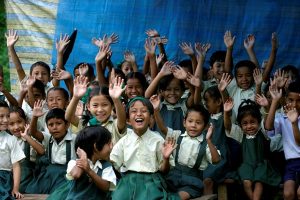Celebrating Steps Forward this World Polio Day
In the lead up to World Polio Day on 24 October, join the Global Polio Eradication Initiative to reflect on the incredible achievements of the past year.

The World Polio Day will be a special one, because in the past year the Global Polio Eradication Initiative has achieved so much worthy of celebration. From reaching long-awaited milestones to increased momentum in polio’s remaining strongholds, we are ever closer to achieving our goal of a polio-free world.
Join the GPEI in recognising the contributions of healthcare workers, volunteers, families, communities, governments, donors, traditional and religious leaders, civil society organizations and partners, all of whom have played a crucial role in the achievements that have been made this year.
Here are just some of the things we have to celebrate this World Polio Day:
This was the year when three became two, with the World Health Organization removing Nigeria from the list of polio-endemic countries, leaving just Afghanistan and Pakistan remaining. With no case of wild poliovirus (WPV) reported since 24 July 2014, a full year has passed with no samples testing positive for WPV across the entire country. This achievement is a tribute to the hard work of countless health care workers, traditional leaders, over 400,000 volunteers and the government who managed to turn the programme in Nigeria around by reaching over 45 million children repeatedly with polio vaccines. There is still a lot of work that needs to be done to keep Nigeria polio-free, but a year without the virus is something to celebrate.
Three also became two when the Global Certification Commission certified wild poliovirus (WPV) type 2 as eradicated. No case of WPV2 has been seen anywhere in the world since 1999, so this official declaration marks a major landmark in global efforts to eradicate all three strains of WPV. It is also coming up to three years since the last case of WPV type 3 was reported in Nigeria in November 2012.
A year without polio in Nigeria anticipated another important milestone: a year without wild polio across the entire African continent. Despite the need to continue to improve surveillance, to reach more children with vaccines and to improve routine immunization coverage, this is a historic achievement that has never been seen before.
Pakistan and Afghanistan will take the world across the threshold of a polio-free world. In 2014, Pakistan reported an alarming increase in the number of children paralysed by polio. Yet the last year has seen real progress, with the government establishing Emergency Operation Centres and launching innovative programmes like health camps which have benefitted nearly 500,000 people in remote areas by reaching them with polio vaccines. As a consequence, 2015 has seen less than a fifth of the number of cases that had been reported by this time last year. In Afghanistan, more than 65,000 people are working and volunteering to stop the virus, despite challenges such as insecurity. By changing the focus from the number of children reached by vaccines to those missed on campaigns, both Afghanistan and Pakistan have increased the number of children that are receiving the crucial doses of vaccine.
As well as the progress seen in the least two remaining polio-endemic countries this year, the WPV outbreaks that began in 2013 in the Middle East, the Horn of Africa and Central Africa appear to have been brought under control. No case has been reported in the Middle East since April 2014 in Iraq; in the Horn of Africa since the last case across the African Continent in Somalia in September 2014; and Central Africa hasn’t reported a case since July 2014 in Cameroon. This progress is down to the commitment of so many people working in often insecure environments to reach every last child multiple times with vaccines, and to strengthen surveillance systems so that every last virus can be traced and stopped.
All of these achievements have only been possible with the devotion and hard work of countless people; since the beginning of the journey in 1988, over 20 million people have worked and volunteered to make polio history. It has been- and remains- a hard road. But the payoff will be a world free forever of polio; millions of children living in the world today and yet to be born who will be safe from this disease.
So while there is much still to do, there is much to celebrate.
Celebrate this progress with the Global Polio Eradication Initiative on 24 October.
This week, the GPEI is curating Gavi’s @Vaccines twitter account, and will be tweeting about global efforts to end polio for good from across the partnership. Follow @Vaccines to read lots of the exciting news from this week.
On 23 Octobver, Rotary International and UNICEF are hosting their third annual World Polio Day event to give a global update celebrating progress and discussing what still needs to be













